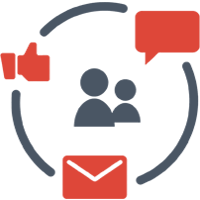Are you a business owner, contractor or subcontractor who’s overwhelmed with the number of projects you have? Do you and your team keep missing deadlines because you can’t seem to stay organized? Have you been longing for something to help you stay on track, but haven’t found just the right system to manage your services?
If you can answer yes to any of those questions, you’re probably in need of a project management software as a solution to your problems. While there are an endless amount of things to consider when you’re selecting a program, here are the top seven things you should be looking for.
- Effectiveness
While having effective project management might seem like something you’d automatically want, there are many different ways that effectiveness can play a role on each of your projects. Identifying how you can be more effective in your projects can make your site (and your life) easier. This can make a world of difference when you’re completing individual tasks and overseeing the entire project. Keeping the scope of your project in mind, write down everything that is eating up too much time, or deadlines you’ve been struggling to hit in each of these categories. Identify each ineffective step from bidding takeoff, to estimating, to tracking employee time and labor costs, to material costs, work orders, inventory and scheduling. Then, decide which of these ineffective steps could be solved with a project management solution. Label your top three and have those be the guide for selecting what’s going to help you complete projects more effectively. This will help you hone in on a project management software that will best fit your needs right now.
- Versatility
When you’re looking for a project management system, you need one that will be able to suit all of your needs on your specific projects or job sites. By definition, versatility means having different abilities or functions. Regardless of the trades or jobs you manage, you need to have a program that can serve multiple areas of your project. For example, if you have an architectural agency that serves clients in a variety of niches, your project management system would need to be able to host different types of documents, blueprints, image content and websites. Without versatility, it is easy for projects (especially large ones) to become jumbled and unorganized.
- Adaptability
Like versatility, adaptability is perhaps the second most important feature that a project management system should have. Projects are subject to change at any point and your system should be able to change along with it — especially on a last minute’s notice. Being able to switch seamlessly between two aspects of your project is essential for subcontractors, employees, service providers and field workers. When choosing your project management system, ensure that it is changeable, agile and easily adaptable.
- Template-Based Systems
Having a standardized system for all your projects allows you to control the way the information is presented — to you, your contractors, your vendors or your client. Creating a way to keep the information organized for each client and job site will make it easier to switch between different projects quickly and efficiently. If you frequently use spreadsheets, find a project management system that is compatible with spreadsheets thereby enabling you to standardize by creating a template.
- Collaboration
Connecting with other members of your team is one of the most important features of a project management solution. Your program should allow you to communicate effectively with the people you’re working with. As you consider various project management tools, look at the ways in which you can dynamically, and easily, collaborate and communicate with all the team members you oversee.
- Tracking Abilities
Being able to stay updated on productivity and new things happening with your project and team is crucial to staying on track. Receiving notifications in a timely manner, responding to messages and even tracking which steps in a project are completed are all features that an effective project management system should have. Making sure that programs are compatible with the technology you use — whether it’s your desktop computer, a mobile device, tablet or personal computer — is also important when selecting a system to use for your projects.
- Organization
Staying organized is crucial to being an effective project manager and should be the main function of your project management system. Out of all the elements that make up a good system, organization is the only one that incorporates every single member of your team as well as all the programs and tools you use. Without a focus on organization, a project management system could only add to the problems you’re having that made you seek out a solution in the first place. So make sure your project management tool is highly honed in on this organizational aspect.
All in all, your project management system should be something that enhances your ability to work with your team to get the job done. When searching for the right solution for your business, project or team, keep these top seven things in mind. It will undoubtedly help you to select the perfect system to help you complete your projects on-time and on-budget.










